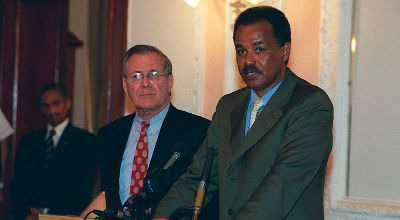When a man broke down and wept openly at a church in Ethiopia, the pastor of the church asked the man what caused his anguish. Distraught, the man revealed that he is an Eritrean Christian who had just fled Eritrea as a refugee. While attempting to cross the border between Ethiopia and Eritrea, he and his son were separated. After three weeks of searching refugee camps, he received the worst news any parent can get: His son was shot and killed by Eritrean border guards.
“I came to Ethiopia to take my son away from persecution. Now I must continue on without him,” cried the grieving father. This story is not atypical for Eritrean Christians. No one knows the exact number of Christians in Eritrea, but they are among the most persecuted on the planet.
The “North Korea of Africa”
Many have called Eritrea the “North Korea of Africa” because of its repressive policies. Unfortunately, Christians find themselves on the wrong side of these policies and are frequently imprisoned and killed for believing in Jesus Christ. Human rights organizations estimate there are more than 2,000 Christians who are currently imprisoned in Eritrea for their faith.
In an interview with International Christian Concern representatives, Dawit, who was imprisoned from 2002 to 2010 for his Christian identity, described the treatment he received in an Eritrean prison. He was one among 150 other Christians imprisoned in the facility he called home for eight years. While imprisoned he was exposed to extreme temperatures, underfed and held inside a dark room for up to six months at a time. As if those forms of torture were not enough, Dawit was also locked inside in a small cell for so long that he lost the use of one of his legs. For eight years, Dawit endured this treatment for his faith.
Why is the government of Eritrea so concerned with Christians that it takes the time and effort to track them down and imprison them? To answer this question, one must look to the country’s leadership.
After 30 years of war with Ethiopia, Eritrea officially became an independent country in 1993. Since independence, the country has been ruled by President Isaias Afwerki, the former leader of the independence movement.
After initially leading the country toward democracy, the Isaias regime became increasingly repressive. Afwerki became paranoid about losing authority and restricted all activities that could threaten his ultimate authority in Eritrea, including religious activities.
In order to exert control over religion in Eritrea, the Isaias regime only allows people to worship within one of the official state religions, which include four denominations of Christianity. Within these official state religions, the Isaias regime exercises near complete control, significantly curtailing any real religious freedom in Eritrea.
In 2002, the Isaias regime attempted to help its international image regarding religious freedom by allowing religious groups outside the official state religions to register with the government so they could worship legally. To register, religious communities must provide detailed financial and membership information, as well as background on all of their activities in Eritrea.
Since this registration requirement came into existence, no religious group has passed the registration process—leading many to believe this new requirement was passed either to improve Eritrea’s international image or as a ploy to gather information on underground religious groups. For now, all religious activity—outside of the highly regulated official state religions—is still illegal. Christians caught conducting religious activities, even something as simple as a Bible study at home, can be arrested, subjected to torture and possibly executed under charges of treason.
Crossing the Border
Many Christians, hoping to find religious freedom outside of Eritrea, are willing to make the journey across the Eritrean border into Ethiopia. The border-crossing is dangerous because of the presence of border guards who are under orders to shoot any and all individuals trying to cross the border without government leave. Christians who are caught trying to cross the border are often imprisoned; others, who are less fortunate, are killed.
Because the decision to cross the border is one of life and death, many Christians turn to criminal groups to smuggle them across the border. According to one pastor in Ethiopia, many of these criminal groups have links to the government security officials and are paid to deliver escaping Eritrean Christians to the country’s prisons. In more extreme cases, Eritrean Christians are trafficked by the groups they have paid to smuggle them out of Eritrea. Instead of arriving in Ethiopia, these Christians find themselves being held for ransom.
In the case of Philemon Semere, the group he hired to smuggle him to Israel abducted him and held him hostage in Egypt’s Sinai Peninsula. The traffickers gave Semere a simple choice—either pay the ransom of $25,000 in cash or else the traffickers would make up their losses by harvesting and selling Semere’s organs.
Semere’s case is not the first of its nature. At first, traffickers who abducted Christians fleeing Eritrea were demanding a ransom between $3,000 and $8,000. Now that they have discovered the value of illegally harvested organs, ransoms have skyrocketed. When payments are not forthcoming, vital organs are harvested in unsanitary conditions. The result of these operations is often death.
Eritrea is internationally recognized as being among the worst abusers of religious freedom. Christians living in Eritrea are often the victims of this abuse. Thousands have been arrested, imprisoned and tortured. An untold number have been killed. This systematic repression has created such a desperate situation for Christians in Eritrea that they have become easy targets for traffickers in East Africa.
The choices faced by Eritrean Christians are bleak; they either continue to live under an extremely repressive regime, risk life and limb to cross a heavily defended border or run the risk of being trafficked by smugglers. Caught between a rock and a hard place, Christians living in Eritrea are an ever dwindling population. Without change, soon there will be no Christians living in Eritrea save those being held in the country’s prisons.
William Stark is the Regional Manager for Africa at International Christian Concern. Click here to read the original article.
See an error in this article?
To contact us or to submit an article






















